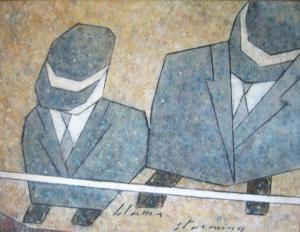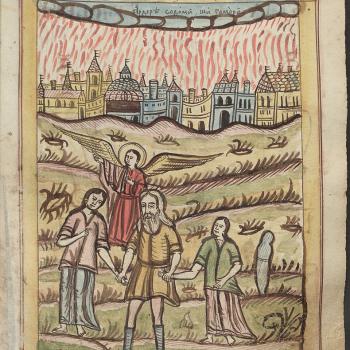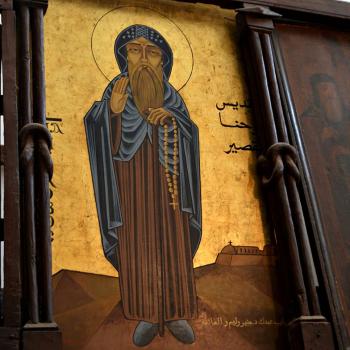
The Black Plague led to all kinds of scapegoating as people wanted to find someone to blame for the plague. Conspiracy theories flourished, though one prominent group of people stood out above all others as being those who were most likely to be targeted; the poor. But, as Michael Mollot indicates, when the poor could not be targeted, others, such as the Jews, faced the wrath of the general populace:
Just as lepers once had been accused of poisoning the wells, now the poor were accused. A report of the viguier (provost) of Narbonne dated 17 April 1348 took note of the confessions of “paupers and medicants of all nations” accused by public hue and cry of having “thrown into the waters, houses, churches, and food supplies, with purpose of killing” powdered portions received from unknown persons who had also given them sums of money. Nine such miscreants had already been drawn and quartered. Where there we no convenient paupers to blame, popular anger was directed primarily at Jews, as in Catalonia and in the Rhine Valley. Popular wrath was also aimed at lenders, usurers, and the rich. [1]
The poor were not just seen as carriers of the plague, but were seen purposefully responsible for its spreading. It should not be surprising that they, and anyone else who was blamed for the plague, felt the ire of the people, and many innocents suffered while the plague continued to spread and devastate Europe.
History shows us this is common. People want easy answers with easy solutions. Plagues routinely require scapegoats. In the third century, starting around 250 CE, the Plague of Cyprian wrecked great havoc across the lands of the Roman Empire (and beyond). The plague named after St. Cyprian of Carthage because he is one of our major sources for understanding what it was like:
This trial, that now the bowels, relaxed into a constant flux, discharge the bodily strength; that a fire originated in the marrow ferments into wounds of the fauces; that the intestines are shaken with a continual vomiting; that the eyes are on fire with the injected blood; that in some cases the feet or some parts of the limbs are taken off by the contagion of diseased putrefaction; that from the weakness arising by the maiming and loss of the body, either the gait is enfeebled, or the hearing is obstructed, or the sight darkened — is profitable as a proof of faith.[2]
It was during this time, Christian leaders promoted works of mercy, suggesting that Christians can and should risk their own lives for the help of those suffering from the plague. If they did so, and they died as a result of their charity, they were deemed to be like martyrs, as we see in a letter Eusebius recorded from Dionysius of Alexandria:
The most of our brethren were unsparing in their exceeding love and brotherly kindness. They held fast to each other and visited the sick fearlessly, and ministered to them continually, serving them in Christ. And they died with them most joyfully, taking the affliction of others, and drawing the sickness from their neighbors to themselves and willingly receiving their pains. And many who cared for the sick and gave strength to others died themselves having transferred to themselves their death. And the popular saying which always seems a mere expression of courtesy, they then made real in action, taking their departure as the others’ ‘offscouring.[3]
We see in Dionysius what the Christian response should be when dealing with a pandemic: Christians should be concerned about the good of others, and not just themselves. They should be willing to sacrifice their petty desires for the sake of the common good. If they suffer and die as a result of doing what is right, Christians should not fear: they will be rewarded for the good which they have done. We do not need to fear death, but this is not to say we should purposefully hasten it, either. We need to take care of people, alleviating their suffering if we can, giving them hope for a better life if we can’t. This was a part of Cyprian’s approach, as he told Christians that even though they suffered equally with non-Christians, they need not worry so long as they continued to act in good faith and follow the dictates of Christ:
For he who wars for God, dearest brethren, ought to acknowledge himself as one who, placed in the heavenly camp, already hopes for divine things, so that we may have no trembling at the storms and whirlwinds of the world, and no disturbance, since the Lord had foretold that these would come.[4]
Christians, in whatever trials and tribulations they face, should always act in justice and charity, even if doing what is right and just would bring them some level of hardship. This is because such hardship is slight compared to what would happen if they abandoned the expectations God has for them. They should not look for scapegoats and find some innocent to blame and punish for whatever nature brings to them, such as the coronavirus. Racism, which is a sin, is a double-sin, when it is used to add to the pain and sorrow of people suffering from the effects of a pandemic: the coronavirus is not the “Chinese Virus;” Chinese people are not to blame for it, and anyone who attacks and harms any Asian as a result of such scapegoating should suffer the full penalties of the law for their actions. Those using the coronavirus to increase a racist ideology must be denounced, no matter who it is that is doing it.
Christians, having been scapegoated for a pandemic before, and having unjustly scapegoated others during the Black Plague, must learn the lesson of history and avoid all scapegoating today. They need to turn to Christ, and follow the way Christ would have Christians deal with people in need. The prophet Ezekiel indicated God’s anger at the rich who ignored the plight of the needy, and did not do what they can to help the sick:
The word of the LORD came to me: “Son of man, prophesy against the shepherds of Israel, prophesy, and say to them, even to the shepherds, Thus says the Lord GOD: Ho, shepherds of Israel who have been feeding yourselves! Should not shepherds feed the sheep? You eat the fat, you clothe yourselves with the wool, you slaughter the fatlings; but you do not feed the sheep. The weak you have not strengthened, the sick you have not healed, the crippled you have not bound up, the strayed you have not brought back, the lost you have not sought, and with force and harshness you have ruled them (Ezek. 34:1-4 RSV).
This tells us what we must pursue. Instead of being concerned about the welfare of the rich and powerful, who will find any and every opportunity they can to use disasters as a way to increase their own wealth, we must look to the good of society as a whole and help heal the sick and do what we can to stop the spread of the coronavirus. Thankfully, many Christians understand this, as they have closed churches in order establish the social distancing needed to limit the number of people who will be infected. Likewise, other initiatives are being suggested, such as when the head of the Ukrainian Catholic Church, his Beatitude Sviatoslav Shevchuk, has said he would open church spaces to doctors so church spaces could be used emergency hospitals. This is exactly in line with the way ancient Christians dealt with the plague.
Yes, Christians can be concerned with their own well-being, and should not purposefully seek out needless suffering. Nonetheless, they need to realize that they are called to help with the common good, to do what they can, to make things better. Social distancing is an act of charity when it will save millions of lives, and those who suffer from such distancing should consider themselves suffering with and for Christ so that they will be rewarded for the good which they have done. Likewise, with those who work out in public, those who do essential work which cannot be stopped, from doctors and nurses, to baggers in grocery stores, we find more heroes who should be acknowledged for the risks and sacrifices that they take for us. And if they, acting in the spirit of charity, become infected and die as a result of their work, we should acknowledge their heroic sacrifice. But what we must not do is make unjust demands on the general population, upon the most vulnerable, saying that they are unimportant and their lives can be sacrificed on the altar of Mammon, which is alas, what so many people are beginning to suggest.
As we continue to see the rise of people infected by the coronavirus, let us take to heart the words of St. Cyprian:
We must not murmur in adversity, beloved brethren, but we must bear with patience and courage whatever happens, since it is written, “The sacrifice to God is a broken spirit; a contrite and humbled heart God does not despise; ” since also in Deuteronomy the Holy Spirit warns by Moses. and says, “The Lord your God will vex you, and will bring hunger upon you; and it shall be known in your heart if you have well kept His commandments or no.” And again: “The Lord your God proves you, that He may know whether you love the Lord your God with all your heart, and with all your soul.” [5]
We must bear out the disruption in our lives with patience. In the short term, it might seem like much is being asked, but if we do not follow through, then we will find the consequences of the coronavirus, even on the economy, will be far worse than anything we face right now. If we think the economy is taking a hit now, it will be nothing in comparison to what could happen if humanity was decimated within a year’s time. The Black Death shows us what is possible; its effects as Michael Mollat writes, could be seen in Europe to this day:
Can it be said that the poor suffered more than other social groups in the Black Plague? The high mortality rate among urban workers may distort the picture. The plague also ravaged the countryside, and even today deserted villages in some parts of Europe stand as reminders of the extent of damage. Despite malnutrition among the peasantry, however, some rural villages, especially those far from the great cities and major roads, were spared. [6]
We have the potential for something similar if we do not act rightly now. We must come together. We must truly promote the common good. We must stop all the scapegoating. And we must hope and trust that once the virus is contained (and vaccines and medicine has been found to help put it to rest), life will go on, and hopefully with a new spirit of comrade, we will be able to establish a more just society than what we had before the disease. It is a trying time. But it is also a time in which we can and should learn invaluable lessons. Let us make sure we do so.
[1] Michael Mollot, The Poor in the Middle Ages: An Essay in Social History. Trans. Arthur Goldhammer (New Haven: Yale University Press, 1986), 197.
[2] St. Cyprian “On Mortality” in ANF(5): 472.
[3] Eusebius, History of the Church in NPNF2(1): 307
[4] St. Cyprian “On Mortality,” 469.
[5] St. Cyprian “On Mortality” in ANF(5): 471-2.
[6] Michael Mollot, The Poor in the Middle Ages: An Essay in Social History, 196.
Stay in touch! Like A Little Bit of Nothing on Facebook.
If you liked what you read, please consider sharing it with your friends and family!













